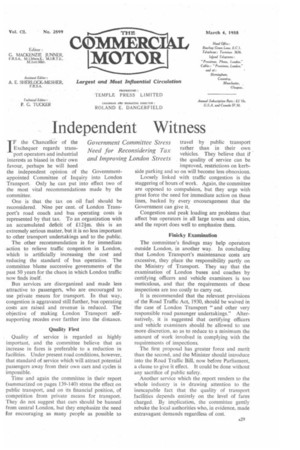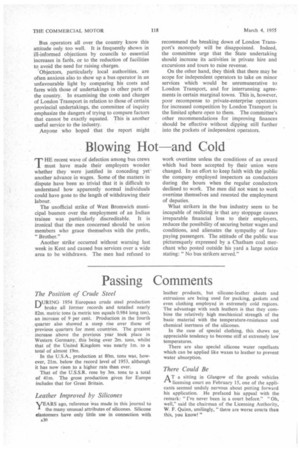Independent Witness
Page 31

Page 32

If you've noticed an error in this article please click here to report it so we can fix it.
Government Committee Stress
Need for Reconsidering Tax and improving London Streets
IF the Chancellor of the Exchequer regards transport operators and industrial interests as biased in their own favour, perhaps he will heed the independent opinion of the Governmentappointed Committee of Inquiry into London Transport. Only he can put into effect two of the most vital recommendations made by the committee.
One is that the tax on oil fuel should be reconsidered. Nine per cent. of London Transport's road coach and bus operating costs is represented by that tax. To an organization with an accumulated deficit of £12-fm. this is an extremely serious matter, but it is no less important to other transport undertakings and to the public.
The other recommendation is for immediate action to relieve traffic congestion in London, which is artificially increasing the cost and reducing the standard of bus operation. The committee blame successive governments of the past 50 years for the chaos in which London traffic now finds itself.
Bus services are disorganized and made less attractive to passengers, who are encouraged to use private means for transport. In that way, congestion is aggravated still further, bus operating costs are raised and revenue is reduced. The objective of making London Transport selfsupporting recedes ever farther into the distance.
Quality First Quality of service is regarded as highly important, and the committee believe that an increase in fares is preferable to a reduction in facilities. Under present road conditions, however, that standard of service which will attract potential passengers away from their own cars and cycles is impossible.
Time and again the committee in their report (summarized on pages 139-140) stress the effect on public transport, and on its financial position, of competition from private means for transport. They do not suggest that cars should be banned from central London, but they emphasize the need for encouraging as many people as possible to travel by public transport rather than in their own vehicles. They believe that if the quality of service can be improved, restrictions on kerbside parking and so on will become less obnoxious.
Loosely linked with traffic congestion is the staggering of hours of work. Again, the committee are opposed to compulsion, but they urge with great force the need for immediate action on these lines, backed by every encouragement that the Government can give it Congestion and peak loading are problems that affect bus operators in all large towns and cities, and the report does well to emphasize them.
Finicky Examination The committee's findings may help operators outside London, in another way. In concluding that London Transport's maintenance costs are excessive, they place the responsibility partly on the Ministry of Transport_ They say that the examination of London buses and coaches by certifying officers and vehicle examiners is too meticulous, and that the requirements of these inspections are too costly to carry out.
It is recommended that the relevant provisions of the Road Traffic Act, 1930, should be waived in the case of London Transport "and other very responsible road passenger undertakings." Alternatively, it is suggested that certifying officers and vehicle examiners should be allowed to use more discretion, so as to reduce to a minimum the amount of work involved in complying with the requirements of inspections.
The first proposal has greater force and merit than the second, and the Minister should introduce into the Road Traffic Bill, now before Parliament, a clause to give it effect. It could be done without any sacrifice of public safety.
Another service which the report renders to the whole industry is in drawing attention to the inescapable fact that the quality of transport facilities depends entirely on the level of fares charged. By implication, the committee gently rebuke the local authorities who, in evidence, made extravagant demands regardless of cost. Bus operators all over the country know this attitude only too well. It is frequently shown in ill-informed objections by councils to essential increases in fares, or to the reduction of facilities to avoid the need for raising charges.
Objectors, particularly local authorities, are often anxious also to show up a bus operator in an unfavourable light by comparing his costs and fares with those of undertakings in other parts of the country. In examining the costs and charges of London Transport in relation to those of certain provincial undertakings, the committee of inquiry emphasize the dangers of trying to compare factors that cannot be exactly equated. This is another useful service to the industry.
Anyone who hoped that the report might recommend the breaking down of London Transport's monopoly will be disappointed. Indeed, the committee urge that the State undertaking should increase its activities in private hire and excursions and tours to raise revenue.
On the other hand, they think that there may be scope for independent operators to take on minor services which would be unremunerative to London Transport, and for interrunning agreements in certain marginal towns. This is, however, poor recompense to private-enterprise operators for increased competition by London Transport in the limited sphere open to them. The committee's other recommendations for improving finances should be effective without dipping still further into the packets of independent operators.












































































































